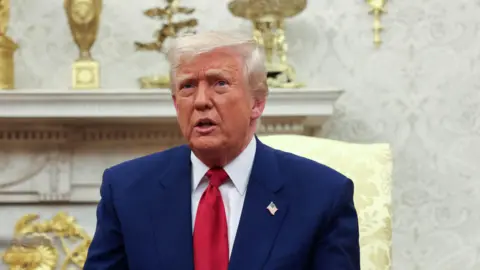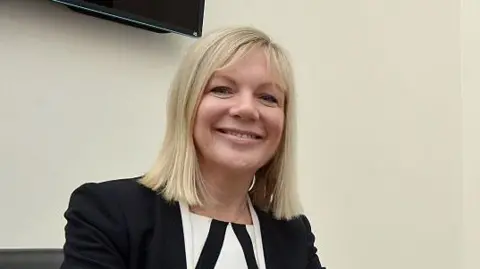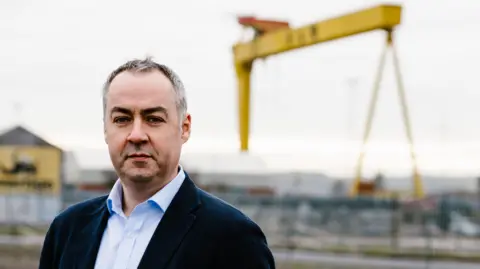'Governments have work to do' on potential Trump tariff effects
 Reuters
ReutersPolitical leaders have a "job of work to do" to ensure US tariffs do not lead to unintended negative consequences for businesses, the head of Northern Ireland's Chamber has said.
Suzanne Wylie said the tariffs announcement "delivered big changes which present a real and substantial test for Northern Ireland businesses".
Speaking as the chamber publishes its quarterly survey, Ms Wylie said it was "calling on our governments to really make sure Northern Ireland is considered throughout all negotiations".
Northern Ireland Secretary Hilary Benn confirmed on Tuesday that the UK government had carried out an impact assessment on how businesses in Northern Ireland might be affected.
He also said the government will take a "calm and considered approach" in dealing with the fall out from the US trade tariffs.
First Minister Michelle O'Neill warned that President Trump was playing a "dangerous game" and said she would make the case to the UK and Irish governments for the "special circumstances" in Northern Ireland to be recognised.
Live updates: The latest as as China vows to fight US tariffs
Analysis: Trump's game of chicken over tariffs leaves world guessing
Explainer: What are tariffs and why is Trump using them?
NI Explainer: How will tariffs affect Northern Ireland?
Your questions answered: Stocks, tariffs and pensions
 Getty
GettyNorthern Ireland goods entering the US face a 10% tariff, under a measure that has been imposed on the UK as a whole.
Goods from the Republic of Ireland will be hit with a 20% tariff as part of measures Trump has imposed on the EU.
A unique factor in Northern Ireland's situation, however, is that it remains in the EU single market for goods under post-Brexit arrangements for trade.
That means it would have to impose any new EU tariffs on US goods coming into Northern Ireland.
'Massive uncertainty'
Ms Wylie said it was key Northern Ireland was kept in mind by governments and that they "work in partnership with business to make sure that we can maintain some of that competitive advantage that we have with dual-market access".
 OCO Global
OCO GlobalGareth Hagan, is chief executive of Belfast-based OCO Global, an advisory firm focused on trade, investment and economic development.
He said the US is Northern Ireland's second biggest trading market after the UK, and there is a "very serious" situation that has to be dealt with.
"I have heard it described this morning as ruination day, we had liberation day last week and ruination day today, we have seen the markets continue to tumble," he told Good Morning Ulster.
"The name of the game here is export diversification, we have a number of very significant trading partners in Europe and the US.
"We need to understand where the opportunities [are] and how those changes impact that, but also to look at opportunities elsewhere in the world.
"For a small economy like us, export diversification is a must and that's heightened even more in the results in the last couple of days."
What else are businesses saying about tariffs?
 Wild Atlantic Distillery
Wild Atlantic DistilleryJim Nash, joint owner of the Wild Atlantic Distillery, near Castlederg, County Tyrone, said for the Irish whiskey industry, the US has "always been the place to go to".
"It was a huge market and we are a new distillery relatively speaking," he said.
"Our first entry into the US was this year, and we are still going ahead with that.
"But tariffs for everybody is creating this massive uncertainty."
However, Mr Nash said there could still be global opportunities and the firm was working with Invest NI in relation to this.
"I was dealing with calls yesterday from the rest of the world, we have meetings now with Canada, Central America, South America, India, Asia, people who are now looking to supplant the bourbon industry and look for other opportunities in other whiskies."
What has NI's Economy department said?
Speaking at Stormont's Economy Committee Economy Minister Dr Caoimhe Archibald said: "The announcement, if you want to call it that, overnight that there are potentially tariffs coming on pharmaceuticals is really, really concerning."
"That would be one of our top exports to the US. So that's something that would obviously cause concern for a lot of businesses here, but similarly so, across the island and in Britain as well, so the implications are significant," she added.
What did the Northern Ireland Chamber survey find?
Its quarterly survey, in partnership with accountancy firm BDO, involved 151 firms and was carried out before Trump's tariffs announcement.
It showed that Northern Ireland's performance was strong in the first three months of this year, despite pressures around high labour costs and the rising cost of raw materials.
In particular, Northern Ireland's export performance was strong, surpassing the UK average.
Almost half of the 151 firms that took part in the survey said they had experienced a slowdown in demand in the first quarter of this year, although for most, this was only a small slowdown.
In the wake of the Trump tariffs, there are now fears that some of those concerns businesses are grappling with, such as inflation and competitiveness, will be exacerbated.
Ms Wylie said that most businesses, according to a survey by the British Chambers, are saying they want negotiation as opposed to retaliatory tariffs and she thinks that would be the case in Northern Ireland as well.
"I think we need to wait and see how the negotiations happen.
"It's obviously a moving feast, but the clarity is not really going to come until we have the negotiations and we see the outcome of those," she added.
EU retaliatory tariffs
The EU will launch its first countermeasures against US tariffs next week.
The 27-nation bloc faces 25% import tariffs on steel and aluminium and cars as well as the new broader tariffs of 20% for almost all other goods.
The EU will put in place duties mostly of 25% on a range of US imports from next Tuesday in response specifically to the US metals tariffs, Reuters reports.
The US imports include maize, wheat, barley, rice, motorcycles, poultry, fruit, wood, clothing and dental floss, according to a document seen by Reuters.
They totalled about €21bn last year, meaning the EU's retaliation will be against goods worth less than the €26bn of EU metals exports hit by US tariffs.
A committee of trade experts from the EU's 27 countries voted on Wednesday on the proposal.
EU diplomats said that 26 EU members had voted in favour, with only Hungary against.
